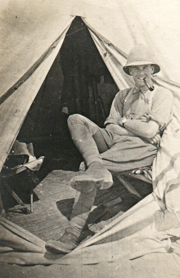The Ross Mountain Battery got away soon after five this morning but our guns didn't appear till nearly ten. They had got stuck in the sand - the sand tyres which we've been issued with to put on the wheels aren't a great deal of use. The sand is very deep indeed here and it was all ten horses in a beam could do to get the guns along at all. We've got to keep twenty four draft horses (six teams) and four riding horses here, so that one section of the battery can be mobile, at least that is what the authorities seem to think, but we think we shall be very lucky if we can keep one gun and firing battery wagon mobile with that number in this heavy sand. All the other horses are at Romani; Elliott and Kenning are with them, I have left "Kitty" and Houghton there too.
The guns are in position about half a mile from our camp in an emplacement, but the major is going to try and get them to let us move the camp up close to the guns and also change the gun positions. Only one detachment have got to sleep at the guns at night as we have got outposts out in front and should be warned in time if the Turks are on the move. The battery is connected up by telephone line to the camp, and the O.Pip is also connected up to the battery in the camp.
The orderly officer has got to sleep at the O.Pip each night with one replacement. I am orderly dog today, so I've got to go out to the O.Pip for the night after mess. It is a sandbag dugout about a thousand yards to the right flank of, and in front of, the guns, just behind the infantry first line trenches. Garside turned up for mess this evening, he'd been seeing the horses of the Glasgow Yeomanry at Romani and they had to come and see these here. He is having the loan of my flea bag tonight as I am in the O.Pip.



On the morning of 25th, the Battery moved off to Mahamdiya, four miles north. The journey was made over very loose sand, keeping in the valleys between the large sandhills, which looked like yellow snowdrifts.
The 4th Royal Scots provided an escort. In addition to six horses, infantrymen manned the drag-ropes (10 to each vehicle), but this method was found useless on the march, as the infantry could not keep pace with the horses, and consequently could not pull on the drag-ropes.
Immediately on arrival the guns came into action in gun positions which had been roughly prepared by a mountain battery.
A "mobile section" was formed out of "B" and "C" Sub-sections, their horses being in the best condition. All the horses returned to Romani under Captain Elliott and Lieutenant Kenning, keeping only four riding horses at Mahamdiya. The wagons and limbers were kept at Romani, 100 rounds of ammunition being dumped in each gun-pit. The drivers' camp was also at Romani.
The Right Section lines were laid out due East, covering Lake Bardawil (gypsum-hard and dried up), whilst the Left Section was laid out South-east, with centre line on "Blair's Post."
Tracks were covered up, and red-coloured nets placed over the guns, to render them invisible from hostile aircraft.
Telephone communication was laid out, and the lines subsequently buried.
One officer and two detachments-sufficient to work the guns-were on duty from dawn till they were dismissed by the 156th Brigade-H.Q., the officer sleeping at the observing station, and the men at the guns. The camp was first pitched about half-a-mile from the guns, and afterwards moved to within 500 yards.
The horses were brought to Mahamdiya every evening, and returned after dawn the next morning.
Water was brought up by camels, both for horses and men, from Romani, at the rate of 10 gallons per horse and one gallon per man. Rations were similarly obtained.